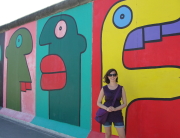LYJ friend and alum, Tanya Nam, is a technical director for a major digital marketing agency in NYC. I recently set her up to mentor a college woman just beginning a computer science (CS) degree.
Below, Tanya answers the student’s questions on the field of technology and provides useful insights for those considering a career in this area.
Q: What drew you to this field and how did you decide it was right for you?
A: I’ve always loved it! Must be partly engineering genes from my mom and dad who both have technical degrees. When I was three I could name all of my dad’s radio electronic parts, then was constantly reading puzzle books, then later begged my parents to get us a computer in exchange for good grades. I originally learned how to operate computers in MS-DOS command line, and skipped computer classes in school because I thought I was smarter than the teacher (shameful, but true).
Getting a CS degree was one of the best decisions that I made (thanks mom for telling me PR was b.s. – confirmed by experience later). I enjoyed my college years immensely, and let me tell you, the school was hard, very hard at times. But it was well worth it, and now it just feels like second nature to me to code and lead technical projects.
If you’re good at solving tech problems (and yes, love math) – definitely go for a CS degree/career in technology.
Q: Do you have any suggestions for someone like me who isn’t that confident when it comes to programming – maybe ways to improve at programming or tech careers that don’t focus as heavily on it?
A: Man, C++ is hard for anyone! Honestly, it was pretty tough to learn C++ and assemblers in school for me too. Good thing is that there are so many other languages and platforms out there (node.js, python, mongodb) that bring fun into coding. And aside from programming, there is a huge need for smart people who grasp technology: information architects and UX designers, community evangelists, talent managers, quality engineers… You can specialize without being a coder.
Q: What skills (technical or non-technical) and personal characteristics would you say are most important to have for a person working in your field?
A: Creativity, curiosity to always learn – as technology constantly evolves, and ability to communicate is crucial, especially when it comes to translating a technical concept to a broader audience. Well, plus being a kind and fun person always helps in any field.
I am still trying to improve on all of the above, every single day.
Q: Do you have any other advice? Is there anything I didn’t ask about that you think is important for a computer science student to know?
A: This is a great closing question – I think I will borrow it for any informational interviews, because it’s perfect for asking anyone who has more expertise in any field.
Tanya’s tips:
Write more, keep a journal or a blog and document your thoughts, challenges and victories. It helps improve writing communication skills, lets you see your progress over time, and may be very useful to like-minded folks and future employers. Best developers are also great communicators (Paul Graham, Jeff Atwood, Marco Arment, Jeff Escalante, Lea Verou)
Embrace tech community. NYC is amazing when it comes to tech events, meetups, classes and hackathons. You can always learn something new and meet with smart people. I especially like the NY tech meetup – very fun and inspiring monthly meeting in quick demo format, all made in NYC!
Doing things is the best way to learn. Try out new technologies (JavaScript alone can keep you entertained for months), work on something you would use and release it online. Sometimes things seem harder than they are, until you actually start doing it, step by step. Then suddenly your app is working – and you feel like the world is at your fingertips.
This interview was originally posted on TanyaNam.com. You can see the original posting here:
http://tanyanam.com/tech_tips/say-yes-to-cs










Get Social